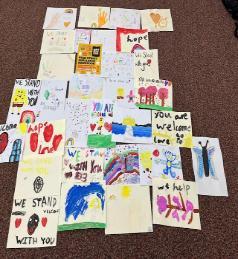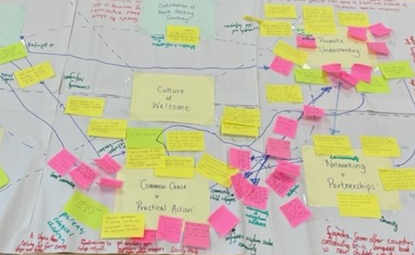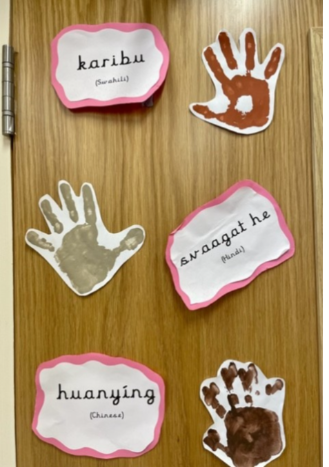Migration and Mobilities
Theme Lead: Dr Mary-Rose Puttick
The ICRD’s work in this area has a particular focus on children, young people, and families from refugee and newly arrived backgrounds and the responses of local authorities and national government policy to support these potentially marginalised groups. Collaboratively working with voluntary and community organisations, schools, hotels, and councils, we engage in knowledge-sharing and network building across a variety of sectors to promote accessibility to education, health services, wellbeing activities, and employment opportunities for individuals and families living in states of flux as a result of their migration status.
An interconnecting aspect across this work is that of collaborative, multilingual, creative methods that foreground and value the voices of diverse groups and their communicative repertoires. Many of the projects are connected through work happening across UK cities as part of the City of Sanctuary network to develop wider public understandings of building a culture of welcome across the UK and as part of impact reach into schools and community spaces, as well as informing local policymaking.
Current Projects
Commissioned by the City of Sanctuary charity and funded by the Paul Hamlyn Trust, this year-long project (ending December 2023) is a collaboration between London South Bank University, the University of Wolverhampton and the University of Sussex. Focusing on the charity’s Schools of Sanctuary strand, the project works with schools in Birmingham, Brighton, and Norfolk using a ‘ripple effect mapping’ methodology to bring together the voices of young people, parents/carers, teachers, and community organisations in an evaluation of City of Sanctuary’s Theory of Change. An output of the project will be a model for schools across the UK Schools of Sanctuary national network to use as a tool to capture the work they are doing to welcome children and families from refugee and newly arrived backgrounds.


This British Council funded project (2022-2023), as part of their English Language Teaching and Research (ELTRA) Awards, aimed to address gaps in professional development for teachers in the schools and third sector to support young people from refugee and newly arrived backgrounds who are living in temporary accommodation and waiting for a school place. Using a Participatory Action Research approach, the project brought together the expertise of professionals working in schools, refugee charities, an arts charity, and City Councils in Birmingham, Sandwell, and Wolverhampton to develop a collaborative approach to knowledge sharing across the refugee third sector and schools.
Participants co-created a professional development resource as an output of the project to address gaps in supporting newly arrived children and young people’s transition to school. The resource is aimed at practitioners working with newly arrived families in the schools and third sector and includes takeaways to use with families, spotlights on inspiring practice from across schools and charities, and more formal activities for individual and group-based professional development. The resource can be accessed and downloaded for free here.

Completed Projects
Dr Bozena Sojka and Dr Andy Jolly evaluated the West Midlands Children’s Services Controlling Migration Fund Programme (hosted by Solihull Metropolitan Borough Council) that seeks to determine the effectiveness of the programme and the outcomes and results being achieved for Unaccompanied Asylum Seeking Children (UASC). The West Midlands Migration Forum programme, commenced in November 2017, seeks to coordinate Controlling Migration Fund Programme (CMF) investment training, workforce development and service support across the region covering education, health, social care and community safety working with all local authorities in the West Midlands to improve the outcomes experienced by UASC arriving and settling in the West Midlands region. We focus on evaluation of an innovative and holistic approach applied by the UASC West Midlands Forum to ensuring that these vulnerable children and young people receive a dignified and caring response that is solution focused, addressing local concerns with regards to the communities they find themselves in.
Dr Bozena Sojka and Dr Andy Jolly evaluated the Wellbeing Project 'Supporting the Emotional, Mental and Wellbeing Needs of Unaccompanied Asylum-Seeking Children’, that was designed to introduce a coordinated approach to providing for the needs of UASC living in Wolverhampton and develop services with the professional skills to respond appropriately to deal with their emotional health and wellbeing issues. This is important because relatively little is known about how this kind of coordinated approach assists in working with UASC at Local Authority level. The findings from this evaluation suggest that the ‘Wolverhampton model’ of collaboration has effectively developed coordinated services that in turn have a positive impact on UASC overall wellbeing.
The West Midlands is a highly diverse area where 10.8% of population identifies as Asian, 3.3% constitute Black population and 2.4% of the population is of Mixed ethnicity. This makes the West Midlands, after London, the most ethnically diverse region in England. Net migration to the UK was estimated to be 258,000 in 2018. This is less than 336,000 in June 2016, just before the EU referendum. The population of the West Midlands is estimated to be 5,800,743, the largest city being Birmingham. Most immigrants residing in the West Midlands live in Birmingham. According to the WHO’s Global Action Plan ‘Promoting the health of refugees and migrants’ (2019-2023) addressing the health and well-being of refugees and migrants in an inclusive manner improves overall global health. With aim to address the health and well-being of refugees and migrants living in Birmingham Dr Bozena Sojka and ICRD were commissioned by the Public Health Division at Birmingham City Council to conduct a joint strategic needs assessment (JSNA) analyses of health needs of migrants and refugees living in Birmingham.
In the UK there are an estimated 674,000 people who have ‘no recourse to public funds’ (NRPF) because of their irregular migration status, including 106,000 UK born children. This population includes refused asylum seekers, clandestine entrants, and those who have overstayed a visa. There are also an unknown additional number of people with temporary leave to remain in the UK who are subject to the NRPF condition and who are at risk of losing employment as a result of the pandemic. This population is at high risk of poverty and insecurity, but little is known about their experiences during the current pandemic.
Dr Andy Jolly and Dr Bozena Sojka worked with partners from the third sector including Migrants’ Rights Network, Project 17, ASIRT, and the Public Interest Law Centre on a rapid response project to understand and map local authority responses to people who are subject to the NRPF condition during the pandemic. The project was funded by the Paul Hamlyn Foundation and used an innovative mix of case studies, survey data and welfare diaries to build up a picture of how people with NRPF have been supported during the lockdown.


/prod01/wlvacuk/media/departments/digital-content-and-communications/images-18-19/iStock-163641275.jpg)
/prod01/wlvacuk/media/departments/digital-content-and-communications/images-2024/250630-SciFest-1-group-photo-resized-800x450.png)
/prod01/wlvacuk/media/departments/digital-content-and-communications/images-18-19/210818-Iza-and-Mattia-Resized.jpg)
/prod01/wlvacuk/media/departments/digital-content-and-communications/images/Maria-Serria-(teaser-image).jpg)
/prod01/wlvacuk/media/departments/digital-content-and-communications/images-2024/241014-Cyber4ME-Project-Resized.jpg)
/prod01/wlvacuk/media/departments/digital-content-and-communications/images-18-19/210705-bric_LAND_ATTIC_v2_resized.jpg)